Over the past 30 years, about 30 degree recipients in Israel have stayed abroad for 3 years or more.[1] Most of them are in the fields of exact sciences and engineering and a significant percentage in the music professions. The percentage of men is higher than the percentage of women. A high percentage of those staying abroad are immigrants, mainly from the former USSR, but also from Uruguay, Argentina and the USA. Over the years, the number of people going abroad is greater than the number returning to Israel after 3 years.

Summary of the CBS data:
- 30,007 (5.6%) of degree recipients from higher education institutions in Israel between the years XNUMX-XNUMX
(2009/10-1980/81), stayed abroad for three years or more as of 2016. - The percentage of those who stay abroad for three years or more is especially high among degree recipients in the fields of exact sciences and engineering than among degree recipients in the fields of humanities and social sciences - 1.6 times for a bachelor's degree, 2.5 times for a master's degree and 3.3 times for a PhD.
- The highest share of those staying abroad for three years or more among PhD degree recipients was in mathematics (24.1%) and computer science (19.3%).
- Among the recipients of a master's degree in medicine, the percentage staying abroad is relatively high and stands at 9.3%.
- The highest share of those staying abroad for three years or more among master's degree recipients was in music (21.1%), mathematics (15.4%) and computer science (14.8%).
- The percentage of those staying abroad for three years or more, who received their bachelor's degree from universities, was significantly higher than that of bachelor's degree recipients from academic colleges, academic colleges of education, and the Open University, and reached 4%.[2]
- The percentage of men staying abroad for three years is higher than the percentage of women (6.7% compared to 4.8%, respectively).
- The percentage of Jews staying abroad for three years or more is higher than the percentage of Arabs (5.7% versus 2.2%, respectively), except for those with a third degree (10.4% versus 11.5%, respectively).
- The percentage staying abroad for three years or more was relatively high among those born abroad, and especially among those born in the former Soviet Union, Uruguay, and Argentina who received a third degree in Israel (29%, 20.5%, and 19.6%, respectively), and among those born in the United States The United States and Canada who received a master's degree in medicine in Israel (27.7% and 29.1% respectively).
- The balance between the new entrants abroad (from 2011 onwards) and the returnees is negative but stable.[3]
In the years 2009 people received academic degrees[4] from higher education institutions in Israel. In 2016, 5.6% of them (30,007) stayed abroad for three years or more.
The percentage of those who stay abroad for three years or more is particularly high among those receiving a PhD and it stands at 10.9%. Among the recipients of a master's degree in medicine, the percentage staying abroad is relatively high and stands at 9.3%. In contrast, the percentage of bachelor's and master's degree recipients who stayed abroad for three years or more is 5.7% and 4.5%, respectively.
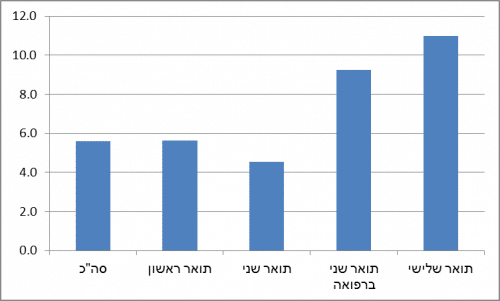
Trends between the years 2016-2012
The percentage of those staying abroad for three years or more increased slightly between 2012 and 2016 in bachelor's and master's degrees, and the upward trend continues in 2016 as well.
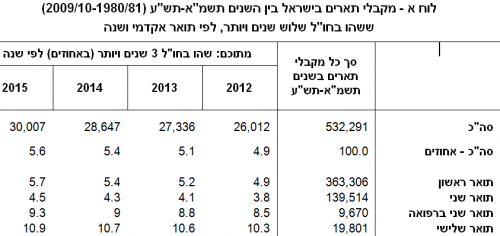
fields of study
Among degree recipients in the fields of exact sciences and engineering,[5] The percentage of those staying abroad for three years or more is significantly higher compared to the fields of humanities and social sciences[6] - 1.6 times in a bachelor's degree, 2.5 times in a master's degree and 3.3 times in a third degree.
Table B - The percentage of those who stayed abroad for three years or more in 2016 among the recipients of degrees in Israel (in the years 2009/10-1980/81) according to the year of receiving the degree and the field of study
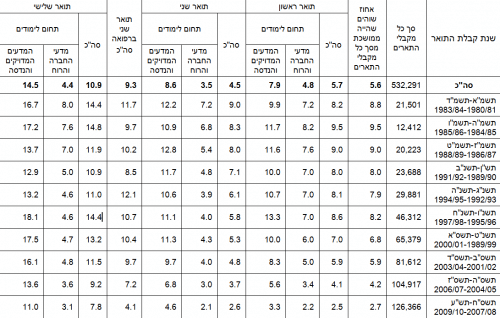
The percentage of those staying abroad for three years or more is higher with a PhD compared to the other degrees. Also, as more time passes since receiving the degree, the percentage of those staying abroad increases. The percentage staying abroad is relatively low among degree recipients who received their degrees in recent years (2009/10-2004/05). Exceptions are PhD degree recipients in exact sciences and engineering, 13.6% of whom stayed abroad for three years or more in the years 11-30 and 80% of them stayed abroad for three years or more in the years 30-2009 ( some for postdoctoral purposes). In fact, the percentage staying abroad among degree recipients who received the degree about 10 years ago (in the early 8.8s) was higher than the percentage among degree recipients about 2.7 years later - in the years XNUMX-XNUMX (XNUMX/XNUMX) ) (XNUMX% and XNUMX%, respectively; see Table B).
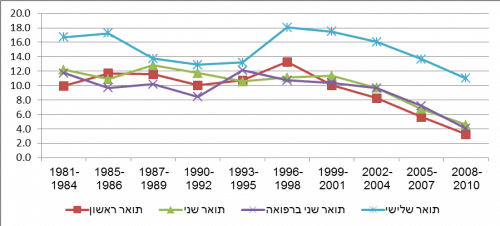
Detailed fields of study
Among the recipients of degrees in the years 2009/10-1980/81, the highest percentage of those who stayed three years or more abroad was among the graduates of the physical sciences (11.8%) and the lowest - among the graduates of degrees in education and teaching training (2.2%). Among bachelor's degree recipients, the highest percentage was in the fields of mathematics, statistics and computer science (10.6%), physical sciences (10.2%) and art, arts and applied arts (10%) and the lowest percentage was among education and teaching training graduates. Among those receiving a master's and third degree, high percentages were found in the field of mathematics, statistics and computer science (13.1% and 20.1%, respectively). Among those receiving a PhD, relatively high percentages were also found in the fields of biological sciences, engineering and architecture (about 14.5%) and auxiliary medical professions (13.9%).
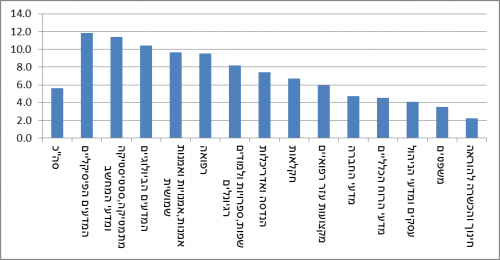
Selected subjects of study
The highest percentage of recipients of first and second degrees who stayed abroad for three years or more is found among recipients of degrees in music (20.6% and 21.1%, respectively). Those who stay abroad for three years or more constitute a significant percentage of mathematics degree recipients: 12% of bachelor's degree recipients, 15.4% of master's degree recipients and 24.1% of third degree recipients. Among bachelor's degree recipients, a high percentage is also found in English and French language studies and international relations studies, and among master's and third degree recipients, a high percentage is found in the subjects of computer science, biology, physics, and chemistry, as well as international relations, electrical engineering, and genetics.
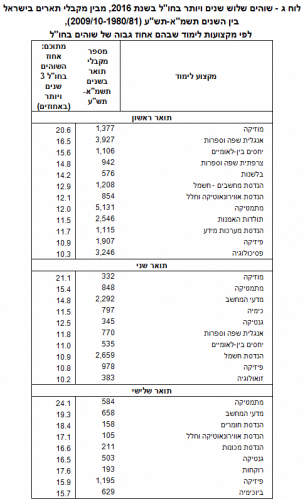
types of institutions
The percentage of those staying abroad for three years or more, who received their bachelor's degree from universities, was significantly higher than that of bachelor's degree recipients from academic colleges, academic colleges of education, and the Open University, and reached 7.4%.[7] The percentage staying abroad for three years or more among bachelor's degree recipients from the academic colleges of education was the lowest (1.8%). In all study frameworks, the percentage of those staying abroad was higher in the fields of exact sciences and engineering.
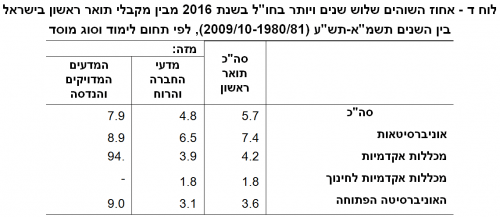
Universities[8]
The highest percentage of those staying three years or more abroad is found among graduates of the Weizmann Institute of Science (20.1%)[9] and the lowest among Bar-Ilan University graduates (3.2%). But even at Bar-Ilan University, the percentage of those who stay three years or more among those receiving degrees in the fields of exact sciences and engineering is higher than those who studied in the fields of social sciences and the humanities - approximately 3 times in the PhD and master's degrees and 2.2 times in the bachelor's degree.
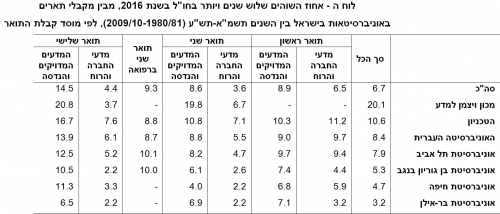
academic colleges
In the academic colleges, the highest percentage of degree recipients between the years 2009-10 (1993/94-15/9.5) who stayed abroad for three years or more was among degree recipients from the Academy of Music and Dance (10.5%) followed by degree recipients from Bezalel (XNUMX%). Among those receiving a bachelor's degree in exact sciences and engineering from the Interdisciplinary Center in Herzliya and the Tel Aviv-Yafo Academic College, about XNUMX% have been abroad.[10]
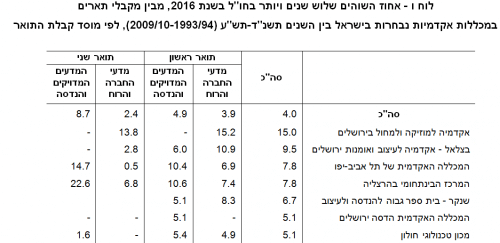
sex
In 2016, the percentage of men who received degrees in Israel in the years 2009/10-1980/81 and who stayed abroad for three years or more, was 1.4 times higher than the percentage of women (6.7% versus 4.8%, respectively). The percentage of men is higher in all degrees and in all fields, but in the third degree in exact sciences and engineering the highest gap is found, and in the second degree in social sciences and the humanities the lowest gap is found.
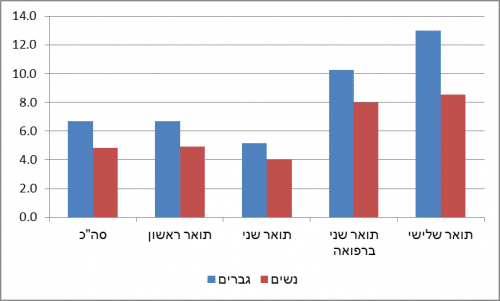
Country of Birth
The percentage staying abroad for three years or more was relatively high among those born abroad, and especially among those born in the former Soviet Union, Uruguay, and Argentina who received a third degree in Israel (29.2%, 21.5%, and 20.1%, respectively), and among those born in the United States The United States and Canada who received a master's degree in medicine in Israel (27.4% and 26.4%, respectively). In 2016, the percentage of natives was relatively lower than the percentage of all those staying abroad in all degrees.
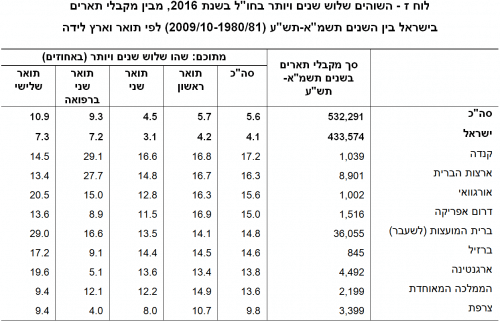
population group
The percentage of Jews who stayed abroad for three years or more was higher than the percentage of Arabs (5.7% versus 2.2%, respectively), except for those with a third degree (10.4% versus 11.5%, respectively).
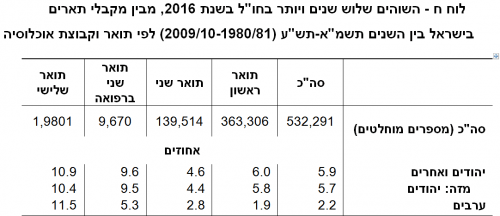
Recipients of degrees abroad who received recognition of their degree in Israel[11]
This group includes recipients of a degree abroad (an institution abroad or a branch in Israel of an institution abroad) and whose application for recognition of the degree has been approved by the Ministry of Education, and who are Israeli residents or citizens. Most of them are immigrants, but some are Israelis who studied in Israel at foreign branches of institutions from abroad.
In Israel, degrees were awarded to 229,523 people between the academic years 2009-10 (1989/90-XNUMX/XNUMX), most of them from the (former) Soviet Union.
In 2016, 11.2% of them (25,736) spent three years or more abroad, a percentage 2 times higher than the percentage of degree recipients in Israel, but similar to the percentage of immigrants who received a degree in Israel.
About 30% of the recipients of degrees abroad who were born in Bulgaria and Brazil in 2016 stayed abroad for three years or more, and 13.9% of the recipients of degrees abroad who were born in the former Soviet Union in 2016 stayed abroad for three years or more.
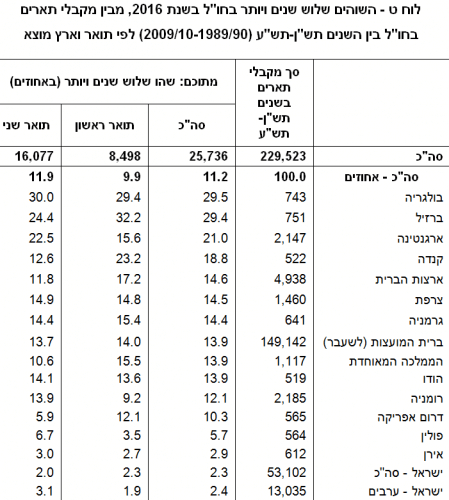
Recipients of degrees abroad according to detailed fields of study
Among the recipients of degrees abroad in the years 2009-10 (1989/90-14.6/19.2), the highest percentage of those who stayed three years or more abroad was among Ph.D. graduates (17.6%) and especially among Ph.D. graduates in mathematics , statistics and computer sciences (9.9%) and the physical sciences (4.3%), and the lowest - among bachelor's degree graduates (5.7%) and especially among bachelor's degree graduates in auxiliary medical professions (XNUMX%) and in business and management sciences (XNUMX%).
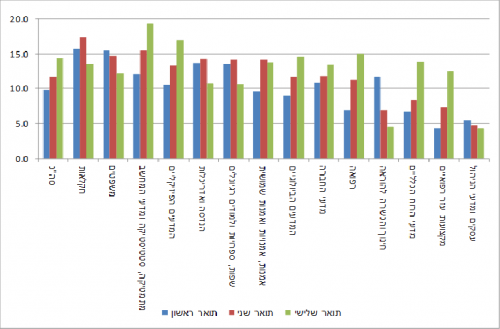
A balance between newcomers and returnees
The balance sheet presents the most recent picture of the trend of staying abroad in recent years. The percentage of returnees refers to those who stayed in Israel for two consecutive years. For example, the percentage of returnees in 2016 refers to those who stayed in Israel in 2016-2015. New arrivals refers to those who went abroad in recent years (from 2011 onwards). For example, the percentage of new emigrants in 2016 refers to those who went abroad in 2014 and stayed there for three years.
In 2016, there were 664 new returnees in Israel after a prolonged stay of three years. However, the number of people staying abroad for an extended stay increases every year, since the number of new departures abroad is greater than the number of returnees. Also, it seems that there is stability in the balance of those who leave compared to those who return in recent years.
The balance sheet shows that the difference between the new emigrants and the returnees is positive, meaning that the immigration balance is negative but stable.

Definitions and explanations
The population includes degree recipients in institutions of higher education in Israel, who were awarded an academic degree (bachelor's degree, master's degree, master's degree in medicine and doctorate degree) as part of the institutions' ceremonies that took place in the years 1980/81 - 2009/10).
Institutions of higher education in Israel include the universities (including the Open University, although otherwise specified), academic colleges and academic colleges of education.
The universities' data refers to the years 2009-10-1980 (81/XNUMX-XNUMX/XNUMX).
The data for the academic colleges refer to the years 2009-10 (1993/94-XNUMX/XNUMX).
The data of the academic colleges of education refers to the years 2009-10 (1989/90-XNUMX/XNUMX).
The Open University data refers to the years 2009-10 (1987/88-XNUMX/XNUMX).
Have a long stay abroad
The definition of staying abroad in a certain year applies to all active individuals in the population registry (those who have not passed away or ceased to be a resident) and who have left the borders of Israel for a year (12 months) with the possibility of visits to their homeland lasting a maximum of 90 days (3 months).
To define a prolonged stay abroad, three consecutive years were chosen in order to create a stronger index than a stay of only one year.
The data of Israelis staying abroad were taken from the database referring to the month of December, except for the year 2009 when the data were taken from the April database of the following year.
Return to Israel
The percentage of returnees refers to those who stayed in Israel for two consecutive years. For example, the percentage of returnees in 2016 refers to those who stayed in Israel in 2016-2014.
Field of Study is the field to which the degree recipients' first subject of study is associated.
All degree recipients from the academic colleges of education Study the field of education and training for teaching.
The study subjects were grouped according to the scientific field to which they belong. Those who studied two subjects are sorted according to the field of the subject that appears first in the institution's file. The scientific fields were presented in tables at two levels of detail, as follows:
15 areas 7 areas
General Humanities Humanities
Languages, literatures and regional studies
Education and training for teaching
Arts, crafts and applied arts
Special and different study programs
Social Sciences Social Sciences
Business and Management Sciences
sentences sentences
medicine medicine
Auxiliary medical professions
Mathematics, statistics and computer science, natural sciences and mathematics
physical sciences
biological sciences
Agriculture Agriculture
Engineering and Architecture Engineering and Architecture
Population group and religion - The "Jews and others" population includes: Jews, non-Arab Christians and those without a religious classification; And the Arab population includes: Muslims, Christian-Arabs and Druze.
Universities: Hebrew University of Jerusalem; The Technion - Israeli Institute of Technoogy; Tel Aviv University; Bar-Ilan University; Haifa University; Ben Gurion University in the Negev; Weitzman Institution of Science; The Open University.
The academic colleges
In 2009/10 (19/9) there were XNUMX state-funded colleges and XNUMX unfunded colleges that awarded degrees[12]:
Ruppin Academic Center; Shankar - Higher School of Engineering and Design; Bezalel - Jerusalem Academy of Art and Design; the Academy of Music and Dance in Jerusalem; Lev Academic Center; The academic track - the College of Administration; Holon Institute of Technology; Ort Brauda Academic College of Engineering; Tel Aviv Jaffa Academic College; Hadassah Academic College Jerusalem; Netanya Academic College; hertzelia Interdisciplinary center; Tel Hai Academic College; Max Stern Emek Jezreel Academic College; Sapir Academic College; Afka - the Academic College of Engineering in Tel Aviv; Ariel Academic College; Sami Shimon Academic College of Engineering; Shaarei Mishpat College - the College of Law Studies; Academic Center for Law and Business; Azrieli - Jerusalem Academic College of Engineering; Ono Academic College; Schechter Institute for Jewish Studies; Ashkelon Academic College; Kinneret Academic College in the Jordan Valley; Peres Academic Center; Safed Academic College; The Center for Academic Studies in Or Yehuda.
Academic colleges of education
Institutions recognized by the Council for Higher Education, and authorized to grant an academic degree in education (B.Ed., M.Ed.):
"Amona" - the academic college for art teaching and education, founded by Efrata and Amona colleges; "Hamda HaDrom" - the Torah College of Education; Orot Israel, an academic college for education founded by the Orot Israel College and the Yaakov Legacy College; Al Qasmi – Academic College of Education; Beit Berl College; The Religious Academic College for Education Shanan; The Arab Academic College for Education in Israel - Haifa; Herzog Academic College founded by Lifshitz College and Herzog College; "Talfiot" Academic College of Education; Mount Washington Academic College of Education; the Academic College for Education and Sports Ohlo in Katsrin; The Academic College of Education named after A. d. Gordon; David Yelin Academic College of Education; Kay Academic College of Education; The Zinman College of Physical Education and Sports at the Wingate Institute; Vizzo Academic Center for Design and Education - Haifa by Neri Bloomfield; "Oranim" Academic College of Education; Jerusalem College; Levinsky College of Education (including the Midrash for Music); Sakhnin College for the training of teaching staff; The Kibbutzim Seminar - College of Education for Technology and the Arts.
BA:
Including degrees such as: B.Ed., B.Tech., B.Sc., BA
Students in the first year of undergraduate studies - according to the institution's report.
Master's degree:
Including degrees such as: M.Ed., MBA, M.Sc., MA and also a Doctor of Medicine degree: MD, DMD.
Ph.D:
Including degrees such as: Dr.Sc., Ph.D.
[1] . The test was done as of 2016, and the data was entered into a database of Israelis living abroad. (See: "Repository of Israeli Residents Abroad", Michal Sabah, 2012 Central Bureau of Statistics technical papers series.) A stay of three years abroad does not indicate intentions to stay abroad.
[2] Most of the degree recipients in the earlier years were from the universities, and as mentioned above there is a connection between the date of receiving the degree and the percentage staying abroad. However, from an examination it was found that even in later years the percentage of university graduates who spend a long time abroad is higher than college graduates.
[3] The rate of returnees refers to those who stayed in Israel for two consecutive years. For example, the rate of returnees in 2016 refers to those who stayed in Israel in 2016-2015.
[4] Includes: bachelor's degree, master's degree, master's degree in medicine (MD) and third degree (PhD). The reference is to the highest degree the person received.
[5] The exact sciences and engineering include: medicine, medical auxiliary professions, mathematics, statistics and computer science, the physical sciences, the biological sciences, agriculture, engineering and architecture.
[6] Social sciences and humanities include: general humanities, literary languages and regional studies, fine arts and applied arts, special and different study programs in humanities, social sciences, business and management, law.
[7] Most of the degree recipients in the earlier years were from the universities, and as mentioned above there is a connection between the date of receiving the degree and the percentage staying abroad. However, from an examination it was found that even in later years the percentage of university graduates who spend a long time abroad is higher than college graduates.
[8] Not including the Open University.
[9] It should be noted that at the Weizmann Institute of Science students study towards a master's degree and a third degree only.
[10] The data on the colleges is available from 1993/94.
[11] The Ministry of Education is the authorized body in the State of Israel to evaluate academic degrees of graduates of higher education institutions abroad, and of affiliates of foreign higher education institutions operating in Israel and which have received a license from the Council for Higher Education in Israel, and this in comparison to the corresponding academic degrees in Israeli institutions.
[12] In the year 2014/15, studies for academic degrees were held at other academic colleges (Ahava Academic College, the Carmel Academic Center, the Western Galilee Academic College, the Israel Academic College in Ramat Gan, the Society and Arts Academic College, and the Shalem Academic Center).
